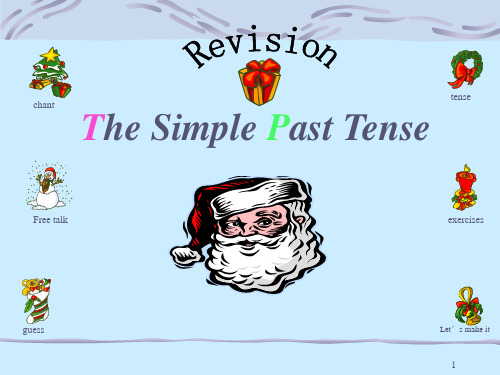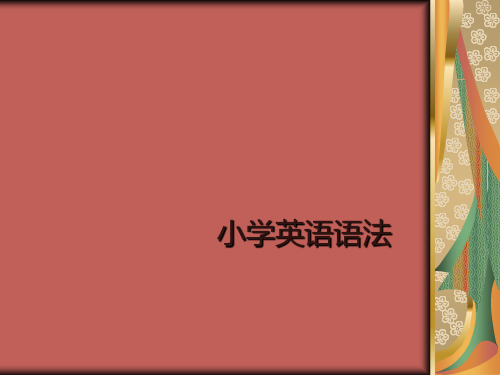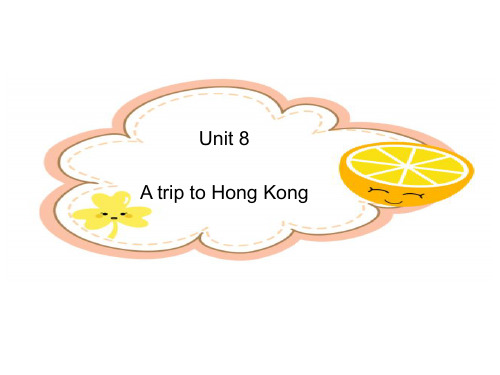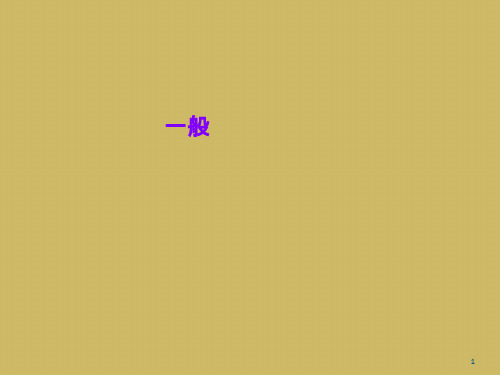精品课件-小学英语一般过去时
小学英语语法复习PPT课件(1)

小学英语语法
六、形容词和副词的比较级复习及练习
一、形容词的比较级
1、形容词比较级在句子中的运用:两个事物或人的比较用比 较级,比较级后面一般带有单词than。比较级前面可以用
more, a little 来修饰表示程度。than后的人称代词用主格
(口语中可用宾格)。 2.形容词加er的规则:
⑴一般在词尾加er ;
小学英语语法
4.以“f或fe”结尾,变f或fe为v, 再加-es, 如:knife-knives leaf——leaves 5.不规则名词复数: man-men, woman-women, child-children;foot-feet;tooth-teeth fish-fish, Chinese-Chinese, Japanese-Japanese
⑵以字母e 结尾,加r ;
⑶以1元音字母和1辅音字母结尾,应双写末尾的辅音字母, 再加er ; ⑷以“辅音字母+y”结尾,先把y变i,再加er 。
小学英语语法
3、不规则形容词比较级:good-better, beautifulmore beautiful 二、副词的比较级 1.形容词与副词的区别 (有be用形,有形用be;有 动用副,有副用动) ⑴在句子中形容词一般处于名词之前或be动词之后 ⑵副词在句子中最常见的是处于实义动词之后
小学英语语法
三、按照要求改写句子 1. Daniel watches TV every evening.(改为否定句) ___________________________________________________ 2. I do my homework every day.(改为一般疑问句,作否定回答) _____________________________________________________ ___ 3. She likes milk.(改为一般疑问句,作肯定回答) ___________________________ 4. We go to school every morning.(改为否定句) ___________________________________________________ 五、改错(划出错误的地方,将正确的写在横线上) 1. Is your brother speak English? __________________ 2. Does he likes going fishing? _________________ 3. He likes play games after class. _________________ 4. Mr. Wu teachs us English. __________________ 5. She don‟t do her homework on Sundays. _______________
小学英语一般过去时态讲解及习题ppt课件

A: What day_i_s_ it today ? B: It _is_ Sunday. A: What day _w_a_s_it yesterday?B: It_w_a_s_Saturday. A: What day _w_a_s_ it the day before yesterday ?
39
It was sunny.
The vacations were great .
How was the weather ? How were the vacations ?
I did my homework yesterday.
What did you …do…?
She played soccer last Sunday.
Did they have…?
My father went to the beach three years ago.
Did your father go…?
Tom and Jack studied for the test three days
ago. Did Tom and Jack study…?
I did my homework yesterday.
Did you do…?
Sshe play…?
He cleaned his room last week.
Did he clean…?
They had a summer camp last weekend.
What did she …do…?
30
Exercise 1. _W_e_r_e_(be) you busy yesterday afternoon? 2. She _w__a_s _ (be) at school this morning. 3. Jane and Ann w__er_e_n_’(tbe not) friends before. 4. He _d_i_d_n_’(tdo not) live in Guangzhou
小学英语时态之 一般过去时讲解课件ppt

一般过去时:
定义: 一般过去时,是表示过去某一时刻或某一段时间内发生的动作或存在
的状态。
标志词: yesterday, just now, …ago, last…, this morning …
结构: 谓语是be动词
谓语是行为动词
肯定句: 主语+ was/were + 其他 否定句: 主语+ was/were + not + 其他 一般疑问句: Was/Were + 主语+其他? 肯定句: 主语+ 动词的过去式 + 其他 否定句: 主语+ didn’t +动词原形 + 其他 一般疑问句:Did + 主语+ 动词原形 +其他?
at the weekends this morning often
usually
last Mid-Autumn Festival
every day three days ago on Mondays
tomorrow a moment ago 14 years ago
找出表示一般过去时的时间副词。
( B) 1. My mother had breakfast and____to work.
A. go B. went C. going D. to go
( A)2. -- How __ your vacation?
-- It was pretty good. A. was B. were C. did D. do
( )3.Each student one picture.
A.draw B. draws C. drawing D.to drawing
小学英语语法PPT课件

五、对划线部分提问。一般情况,一般将来时的对划线 部分有三种情况。 1、问人。Who 例如:I‟m going to New York soon. →Who‟s going to New York soon. 2、问干什么。What … do.例如: My father is going to watch a race with me this afternoon. →What is your father going to do with you this afternoon. 3、问什么时候。When.例如:She‟s going to go to bed at nine. →When is she going to bed? 六、同义句:be going to = will I am going to go swimming tomorrow(明天). = I will go
2.行为动词的变化。 否定句:主语 don„t( doesn‟t ) 动词原形( 其它)。 如: I don't like bread. 当主语为第三人称单数,用doesn„t构成否定句 如:He doesn't often play. 一般疑问句:Do( Does ) 主语 动词原形 其它。 如- Do you often play football? - Yes, I do. / No, I don't. 当主语为第三人称单数,要用does构成一般疑问句 如 -Does she go to work by bike? - Yes, she does. / No, she doesn't.
小学英语语法
名词复数规则
1.一般情况下,直接加-s,如:book-books, bag-bags, cat-cats, bed-beds 2.以s. x. sh. ch结尾,加-es, 如:bus-buses, box-boxes, brushbrushes, watch-watches 3.以“辅音字母 y”结尾,变y为i, 再加-es, 如:family-families, strawberrystrawberries
【精品课件】六年级上册Unit-8-A-trip-to-Hong-Kong(共74张PPT)

are的过去式 更好的 坐 惊讶的 直到 感觉 后来
练一练
写出正确字母使单词完整
fe_t
sur_ _ised
s_t
un_il
练一练
写出正确字母使单词完整
felt
surprised
sat
until
短语宝典
went on a trip
stayed with sb.
短语宝典
took a photo
金句演练
3.我妈早上把我叫醒。 __________________
金句演练
3.我妈早上把我叫醒。 My mother woke me up in the morning.
游戏时间
游戏规则
谈论一件 最开心的事情
加油! have a try!
知识拓展
一般过去时 定义:表示过去某个时间里发生的动 作或状态;过去习惯性、经常性的动 作、行为,过去主语具备的能力、性 格。
句型转换
②辨认结构形式。 a. 特殊疑问词+系动词情态动词+主语+其他?
eg: I could go to school. →
Where could you go?
学以致用
1.写出下列动词的过去式。 (1) have ____ (2) do ____ (3)go____ (4) study____ (5)read____ (6) live____
特殊疑问词+一般疑问句
知识拓展
动词过去式的变化
1. 一般在动词末尾加-ed , eg: pull-pulled, cook-cooked 2.以e结尾的动词,在变为过去式时加-d , eg: live-lived,smile-smiled 3.词尾是一个元音字母和一个辅音字母的重读闭音节,双写末尾的辅音 字母,再加-ed , eg: stop-stopped 4.以"辅音字母+y"结尾的用词,变y为i ,再加-ed, eg:study-studied
小学六年级下册英语小升初时态课件(通用版) 一般过去时总复习2

4.疑问was/were调句首
• Were you at home the day before yesterday﹖ • Was she happy this morning﹖
肯定回答 Yes, 主语+was/were. 否定回答 No, 主语+wasn't/weren't. Were Xiao Qiang and Xiao Long here just now﹖
• yesterday或以其构成的短语: • yesterday morning • yesterday afternoon • yesterday evening • the day before yesterday
three days ago
Miss Zhu went to Tiantian Market three days ago.
其他家族
Long long ago
yesterday Now
一般过去时 yesterday ago just now in the old days in those days in 1980 the other day at that time once upon a time
一般将来时
现在 进行
• 现在学过的常用的表示过去的时间状语有: just now,a moment ago,yesterday,last week,last night, last weekend,last year,last month,three days ago,two weeks ago,five years ago…
• (3)末尾只有一个元音字母和一个辅音字母的重读闭音节,应 双写末尾的辅音字母,再加-ed,如:stop-stopped, shop-
一般过去时ppt课件

T
2.简略回答用助动词did/didn’t代替
行为动词。
Did he find the boy yesterday?
-Yes, he did.
-No, he did not (didn’t).
28
写出下列动词的过去式
1. look looked 11. go
went
2. live lived
12. have has
morning
yesterday afternoon
evening
the day before yesterday 25
4.与one 连用: morning
one
evening day
Monday afternoon
5.与that 连用:
that
morning winter day year
26
6.其他时间状语:
4.What time diydou ( geett) to school this
morning?
5.Jim di(ddo) a lot yesterday. He (go)
swhoepnpt ing and
(cook) csouopkpedr.
31
1.Lucy did her homework at home.
Does he go to school by bus every day?
Did he gtoo school by bus yesterday?
don’t/ doesn’t
didn’t
do/ does
did 10
谓语构成
1.动词 be
was , were
2.动词 have, has
小学英语一般过去时态

一般过去时(PEP Book 8 Unit 3 Last Week / Unit 4 My Holidays)Hello, boys and girls! 今天我们讲一般过去时,分三个方面讲述,大家可要认真听哟!I. 一般过去时的概念一般过去时表示过去某个时间发生的动作或存在的状态。
常和表示过去的时间状语连用。
如:last year, yesterday等;也可表示过去经常反复发生的动作,常和often, always等频率副词连用。
例如:①I saw him in the street yesterday. 昨天我在街上看见他了。
②Li Mei always went to school on foot last year. 去年李梅总是步行上学。
II. 一般过去时的构成动词过去式的构成:(1)规则动词过去式的构成有四条规则:①一般在动词原形末尾直接加上-ed。
如:look-looked。
②以不发音的字母e结尾的动词,去e再加-ed。
如:live-lived。
③末尾只有一个辅音字母的重读闭音节,先双写这个辅音字母,再加-ed。
如:stop-stopped。
④末尾是辅音字母+y结尾的动词,先变y为i,然后再加-ed。
如:study-studied。
(2)不规则动词的过去式需特殊记忆。
如:am(is)-was, are-were, go-went, come-came, take-took, have (has)-had等。
III. 一般过去时的几种句型肯定句结构为:主语+动词的过去式+其它。
如:He went to the toy store yesterday. 他昨天去玩具店了。
否定句结构为:主语+did not (didn't)+动词原形+其它。
如:He didn't go to the toy store yesterday. 他昨天没去玩具店。
一般过去时的一般疑问句的构成:Did+主语+动词原形+其它?如:1) -Did you go to Beijing last week?-Yes, we did. (No, we didn't.)2) -Did you meet the businessman before?-No, I didn't. (Yes, I did.)一般过去时的特殊疑问句的构成:疑问词+did+主语+动词原形+其它?如:1) -What did you do last night?-I did my homework.2) -Where did you go last week?-I went to Shanghai with my parents.一般过去时口诀一般过去时并不难,表示过去动作、状态记心间。
- 1、下载文档前请自行甄别文档内容的完整性,平台不提供额外的编辑、内容补充、找答案等附加服务。
- 2、"仅部分预览"的文档,不可在线预览部分如存在完整性等问题,可反馈申请退款(可完整预览的文档不适用该条件!)。
- 3、如文档侵犯您的权益,请联系客服反馈,我们会尽快为您处理(人工客服工作时间:9:00-18:30)。
(掌握)
clean Visit Want cough watch
cleaned Visited Wanted coughed watched
2、结尾是 e 的动词只加 -- d (了解)
live hope use
lived hoped used
3.重读闭音节词, 先双写这个辅音字母,再加—ed
stop Pat
• → Were they in Li Yan’s home last night? • (一般疑问句)
• →Yes, they were. (肯定回答) • →No, they weren’t. (否定回答)
一般过去时一般疑问句及其肯否定回答 练习题
1. They had a good time in the park.
小学英语一般过去时
• 表示:
时态和时间
past now
future
动词过去式 的构成
规则动词
regular verbs
不规则动词
irregular verbs
规则动词 过去式的构成
1、一般在动词末尾加– ed
look Walk paint play
look ed Walked painted play ed
4. My brother was in the park just now.
• 一般疑问句: • Was your brother in the park just now?
肯定/否定回答: Yes, he was. No, he wasn’t.
一般过去时练习题
• Her father ___re__a_d_ (read) a newspaper last night. • We ___w__e_n__t_(go) to the zoo yesterday. • ___D_i_d_ you ___v_i_s_it_ (visit) your relatives last Spring
肯定句: We were busy last week.
否定句: →We were not busy last week.
2.(行为动词类)要在行为动词的前面加助动词didn’t. 然后把 动词过去式改为动词原形。 即:didn’t + 动词原形
肯定句: She played the violin last night.
一般疑问句: Did they have a good time in the park?
肯定/否定回答: Yes, they did. No , they didn’t.
2. Ann did her homework yesterday evening.
一般疑问句: Did Ann do her homework yesterday evening?
否定句: →She didn’t play the violin last night.
肯定句: They swam in the lake yesterday.
否定句: →They didn’t swim in the lake yesterday.
一般过去时否定句练习
肯定句: They made a kite a week ago. 否定句:They didn’t make a kite a week ago.
2.把元音字母变成“a”
come give Become
came(掌握) gave became
drink begin
drank(了解) began
剩余不规则动词
剩余不规则动词表 Infinitive Past Tense Infinitive Past Tense
am, is are do
go have make get
(1) He was born in Shanghai. → Was he born in Shanghai? (一般疑问句) →Yes, he was. (肯定回答) →No, he wasn’t. (否定回答)
一般过去时
1.一般过去时表示过去某个时间发生的动作或存在 的状态,常和表示过去的时间状语连用。
肯定/否定回答: Yes, she did. No, she didn’t.
• 3. I read an English book last week.
一般疑问句: • Did you read an English book last week?
肯定/否定回答: Yes, I did. No, I didn’t.
stopped Patted (掌握)
4. 以“辅音字母+y”结尾的词,
先变“y”为“i”再加—ed
study
studyied
Worry
Worryied
Early Happy
Earlyied Happyied
不规则动词 过去式的构成
1.过去式与原形一样(了解)
put→put (放下) let→let(让) cut → cut(砍,剪) read→read(读)
was were did
went had made got
eat
ate
say said
see saw
一般过去时 肯定句变否定句
Be动词类 • 否定句
实义动词类
1. (be动词类)在表示过去存在的状态 的句子中在was, were的后面加上not。
如: 肯定句:
He was in the park the day before yesterday. 否定句: →He was not in the park the day before yesterday.
肯定句: He was ill yesterday. 否定句:He was not ill yesterday.
肯定句:The cat ate a bird last night. 否定句:The cat didn’t eat a bird last night.
一般过去时的 一般疑问句
1.把was, were放在句首,其余位置不变。
Yesterday(昨天), last night(昨天晚上), last week (上周) Last Sunday(上周日)
in 1990 just now (刚才), long long ago(很久以前)
• (2)They were in Li Yan’s home last night.
